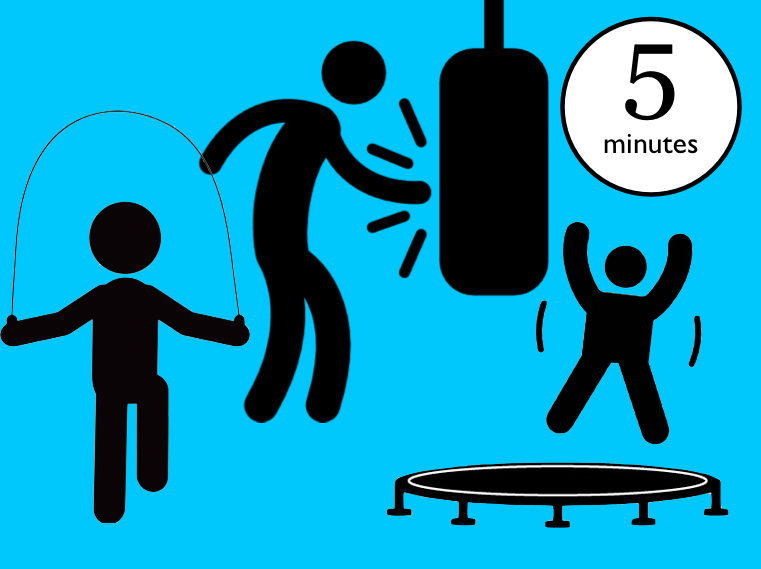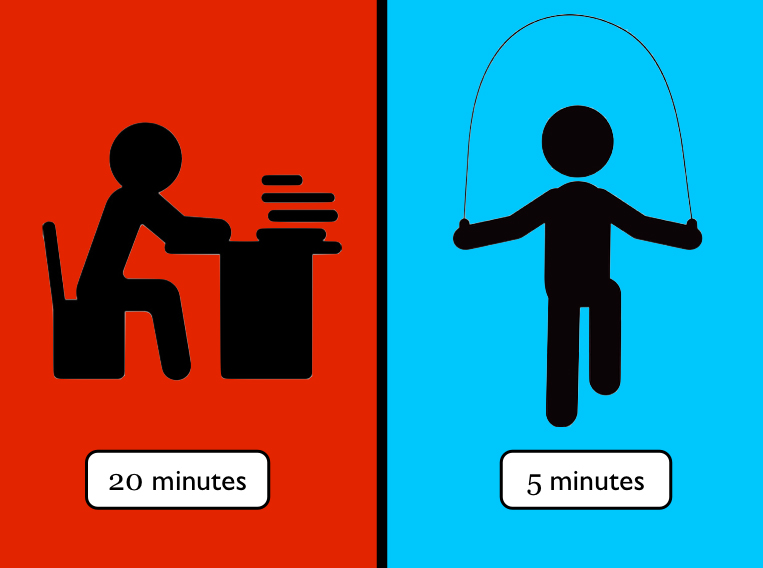
Do you find yourself getting distracted when you study?
Here’s a simple thing you can do to help you focus better and improve your study sessions . . .
Take regular exercise breaks.
A study titled Sweat so you don’t forget found that engaging in regular five minute exercise breaks reduced mind wandering, improved focus, and enhanced learning.

In this study the researchers wanted to know if engaging in short exercise breaks could help with learning.
They took a group of 75 psychology students and split them into three groups.
Group 1: Exercise breaks group
Group 2: Non-exercise breaks group
Group 3: No breaks group

All the students had to watch the same 50 minute psychology lecture. But the difference between the groups was this . . .
The exercise breaks group performed five minutes of exercise every 17 minutes. The non-exercise breaks group played a simple video game for five minutes every 17 minutes. The no breaks group had to watch the entire lecture without getting a single break.
What did the researchers find?
The students in the exercise breaks group could focus better and they retained more information. They also found the lecturer easier to understand.
The researchers said:
“The exercise breaks buffered against declines in attention resulting in superior engagement during the latter part of the lecture compared to the other two groups.”
What about the people who had the computer game breaks?
One would think they would show some improvements in attention and memory since they were getting breaks. But they didn’t show any significant improvements.
In fact, they performed just as well as the no breaks group in terms of attention and memory.

The researchers concluded:
“One possibility is that the computer game played during the non-exercise break may have acted as a second cognitive task as opposed to a cognitive break. Switching between two cognitive tasks can deplete attention and impair performance for both tasks.”
This shows the type of activity you engage in on a study break is really important. It pays to get out of your head and move your body!
What exercises were the exercise break group doing?
It was a series of exercises performed for 50 seconds each followed by a rest break:
1) Jumping jacks (50 seconds) + Rest (10 seconds)
2) Heeltaps (50 seconds) + Rest (10 seconds)
3) High knees (50 seconds) + Rest (10 seconds)
4) Split jumps (50 seconds) + Rest (10 seconds)
5) Hamstring kickers (50 seconds) = The End
Since reading this study, I’ve started to incorporate more exercise breaks into my day and I’m noticing a big difference.
Personally, I’m not a fan of some of the exercises the researchers made the participants do in this study. So, I have replaced them with other cardio exercises I enjoy doing, such as punching a boxing bag and using a skipping rope.
I also find doing 50 seconds of non stop exercise pretty exhausting. For this reason, I’ve reduced my exercise time down to 40 seconds followed by a 20 second rest break. I find it helps to time my exercise sprints/rest breaks using an interval timer on my phone instead of a kitchen timer (which can feel a little clunky).
Feel free to experiment with different exercise/rest ratios. Make it work for you. As your fitness levels improve, you can increase the period of time you exercise for.
So, here’s my challenge to you . . .
After working for 20 or 30 minutes, get up and take a five minute exercise break.

You don’t have to do jumping jacks or hamstring kickers. Select simple exercises you want to do.
Notice how you feel before and after your exercise break.
After experimenting with this simple strategy, I can say with confidence that I feel more energised and mentally sharper throughout the day. Try it and let me know how you go!
